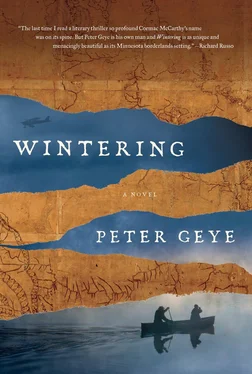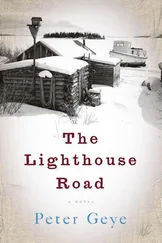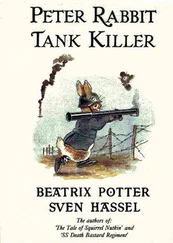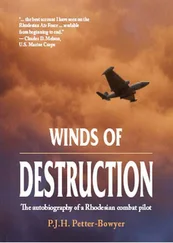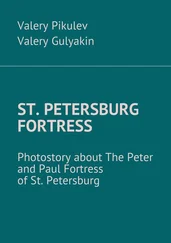—
A week or more passed with hardly a word between the two of them. Each morning Gus went back to the oaks and waited for the bear to return. Though her sign was everywhere — more scat, trees clawed to hell, tracks trailing into the denser woods beyond — he didn’t see her again until the day the first lasting snow came. By then he’d worn a path from the shore into the oaks and made a regular shanty of the deadfall blind. He took his spot that morning, while the snow began, and waited. When the bear didn’t show, he figured she’d gone into hibernation, what with the cold, fresh weather. So he left the blind an hour after sunrise, had sawed three inches into his oak, and was already sweating when he heard her grunts. There, not twenty yards behind him, sitting on her flanks, staring at him with her dark eyes, her nose and ears twitching, the bear waited. Gus looked quickly at the Remington resting in its notch in the blind, the barrel camouflaged by the dead branches.
The bear grunted again and ran a paw through the snow like she was drawing a line. She was larger than he remembered. He jimmied the saw blade from the trunk and the bear sat up as though prodded, took a step toward him, shuffled back, then another step forward, her nose low to the ground, her eyes never once leaving his. Gus could hardly draw a breath.
A long moment passed before he found his wits and moved slowly toward the blind. The bear stood watching on her hind paws, but he kept walking slowly, and backward. When he got there he reached for the gun. The bear took another step toward him.
The twenty yards between them might as well have been twenty inches, given how near she felt, so close he could smell her and see the wet of her eyes. And she felt nearer still when he raised the Remington to his shoulder and sighted her, first through the scope and then with both eyes open down the barrel. Her eyes remained fixed in return.
By that time in his life, Gus had killed over a dozen deer. Countless grouse and ducks and wild turkeys. A stringer of hares each winter since the fourth grade. He could hit a soup can from a hundred yards even with a stiff wind on his cheek. When he lowered the gun barrel after pulling the trigger, there was no earthly reason that the bear shouldn’t have been lying in a heap. But she wasn’t. In fact, by the time he ejected the spent cartridge and levered another into the chamber and raised the rifle again, the sow was already near the dark edge of the pines. Gus blinked and she was gone.
The air reverberated with the shot. His hands thrummed. He checked the magazine to prove he’d actually pulled the trigger. One cartridge was indeed spent. Five remained. He walked slowly to the spot where the bear had stood. Blood had sprayed across the snow and followed the footfalls running toward the dark woods. The drops might as well have been electric lights, so bright were they against the snow.
He patted his hip to check for his knife, loaded another cartridge into the magazine, and followed the tracks into the woods. The pines were so dense so soon that it seemed impossible the bear could have shouldered through them, but her bloody trail kept unfurling before him. The trampled saplings and low-hanging boughs offered more proof of her passage. Gus pressed on.
After some time clearings between trees opened and the bear’s gait lengthened. She was still bleeding, but not as much. His shot hit her in the right shoulder or ribs, since the blood trailed on the starboard side of her tracks, a stain for each new stride. The terrain began to arch and fall. Boulders the size of the bear herself cropped up, covered in snow, and more than once Gus startled at the sight of one. He walked for a quarter mile before the land dropped into a sharp valley where a wide creek ran along the bottom. He could see where the bear had paused on the shore. A pool of blood had already cooled in the snow, and Gus could see where her haunches had rested while she drank. He stopped for a moment himself, took a drink from his canteen, and wiped the sweat from his brow.
The snow had stopped and he felt a fleeting relief. It must have been past noon, judging by the light behind the clouds. They promised nothing if not more snow. As if thinking this had made it so, light flakes began blowing through the trees above, bringing with it a different tang to the air and a new kind of dread.
He hiked upstream first, looking for the trail of blood to begin again on the opposite bank. For fifteen minutes he cased the shore, then backtracked for an hour until he spotted her trail heading up a steep embankment, above where the creek’s course narrowed into a sault choked with boulders and driftwood. It was by then snowing hard, the bear’s blood pinkening under the white of it.
The hillside rose steady and steep for perhaps two hundred feet. Pines and spruce again, thick and dark. He crossed the creek over the sault on a snow-covered log and he prowled the dense woods for hours. The snow had stopped and started three times before the sky lightened. When the sun came out it was already resting over the southwestern treetops. Gus was ravenous and tired and had lost the bear’s trail entirely. Obeying one law of the woods, he’d violated another, and now he was lost. As sure as the sun would set, he would have to spend the night in those woods. And with what? No food. An empty canteen. No cover. He had his hat and gloves, but he’d sweated through his shirt and long johns and his boots were soaked from the snow.
Harry would have heard the shot and assumed he was now tracking his prey or field-dressing his kill. He’d have taken it for granted that Gus would leave enough time to get out of the woods in the daylight, would’ve left the carcass behind when dusk approached. Harry wouldn’t start worrying until sunset, and even if on some instinct he’d paddled across the bay and discovered Gus’s canoe and then the bur oaks with hours of light left, the snow would’ve covered the tracks, the bear’s and his alike.
—
He needed shelter. And fire. He was sure of this, if nothing else.
So he wandered through the gloaming. Just down a slope he found a spruce, its boughs dead and rust-colored and covered with snow. He walked around it. The tree had snapped eight or so feet aboveground and the trunk rested against the hillside. Gus crawled under the boughs at the open end. Four feet inside, the ground was dry. He broke dozens of dead limbs to clear enough room to stretch out, which he did. Through the interstices of the boughs above he caught the first moments of darkness as they arrived.
Years later, what he remembered most was his simple and unadulterated fear, unaccompanied by any other emotion. At times it felt like a physical thing, as real as the dead tree or the snow. For a spell he lay in the grip of it, unable to open his eyes, much less start a fire. But he must have moved. He survived, after all.
He didn’t recall building the fire or stockpiling the wood to burn through the night, or melting snow in his canteen, and knew he had only because it was half full in the morning. Nor did he remember stripping down to his skivvies and hanging his wet clothes near the fire to dry, though he did recall waking nearly naked and shivering only inches from the flames. And weeping long enough that his clothes had dried and he put them back on and he felt parched.
He thought a lot about the bear that night. How, if he hadn’t been in the woods to shoot her that day, she might have finished her acorns, taken a long study of the falling snow, and come to just such a place as that fallen spruce, where she would have curled into herself and settled down for the winter without need of a fire to keep her warm.
He remembered waking and his fear still looming there in the fire’s warm light. He cursed everything that night. His father. His mother. The maps. The canoes. Charlie Aas. The bear and the woods and the snow. He cursed the stars, too, when they showed on and off from behind the clouds. Their brightness made the night somehow more sinister than the sheer darkness, lighting up the snow and shining back blue and reminding him with every tiny wink how lost he was.
Читать дальше
